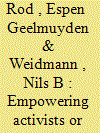| Srl | Item |
| 1 |
ID:
138830


|
|
|
|
|
| Summary/Abstract |
Theories of conflict diffusion have long argued that domestic conflict spreads from one country to others. One set of mechanisms explaining this relies on material flows across borders that incite violence in neighboring countries. Another set of mechanisms, however, relies on informational flows. Information about ongoing violence elsewhere triggers strategic learning and demonstration effects in subnational conflict actors which may increase the likelihood that these actors ultimately resort to violence. While the first set of mechanisms can be – and has been – assessed using spatial proximity to define connections between countries, this article provides a test of the second mechanism by analyzing communication flows. The article shows that the occurrence of ethnic conflict in a country’s main communication partners significantly increases the probability of domestic ethnic violence, and that this effect operates in conjunction with, and is at least as strong as, the spatial contagion effect of conflict in the geographic neighborhood.
|
|
|
|
|
|
|
|
|
|
|
|
|
|
|
|
| 2 |
ID:
138834


|
|
|
|
|
| Summary/Abstract |
The reported role of social media in recent popular uprisings against Arab autocrats has fueled the notion of ‘liberation technology’, namely that information and communication technology (ICT) facilitates organization of antigovernment movements in autocracies. Less optimistic observers, on the other hand, contend that ICT is a tool of repression in the hands of autocrats, imposing further restrictions on political and social liberties. We investigate whether the liberation- or the repression-technology perspective can better explain empirically observed patterns. To this end, we analyze two outcomes. First, we look at which autocracies are more likely to adopt and expand the Internet. In line with the repression technology expectation, we find that regimes aiming to prevent any independent public sphere are more likely to introduce the Internet. Second, we study the effects of the Internet on changes towards democracy. This analysis reveals no effect of the Internet on political institutions. These findings provide moderate support for the ‘repression technology’ perspective, and suggest that the Internet has not – at least in its first two decades of existence – contributed to a global shift towards democracy.
|
|
|
|
|
|
|
|
|
|
|
|
|
|
|
|